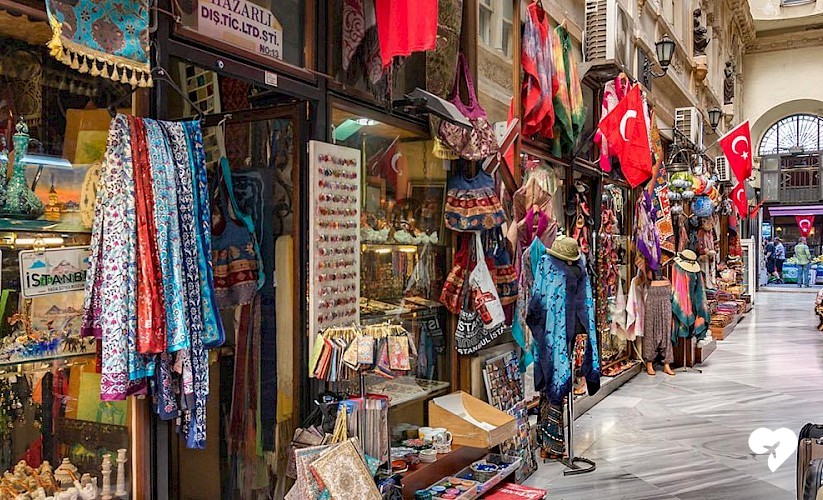Beyoğlu is famous for its “passages,” or arcades/galleries (“Pasaj” in Turkish). The arcades are full of shops selling all kinds of wares, with great prices and the ability to make some real discoveries. These arcades are often Victorian buildings, with shops located on different floors and sometimes you really have to search to find the best stores!
But we’re here to help, here are 7 of the best passages you’ll find anywhere in Beyoğlu.
Çiçek Pasajı (Flower Passage)
Possibly the most fun, colorful passage in Beyoğlu. Çiçek Pasajı still harks back to the Taksim of yesteryear. During the Tanzimat period, Sultan Abdülhamit and Sultan Abdulaziz came to see the theater in Beyoğlu, the famous Naum Theater in the corner of İstiklal Caddesi and Sahne Street. Verdi's famous opera "II Trovatore" was staged in this theater before it was even shown in Paris. The theater was built again as a passage after it burned down in the Great Beyoğlu Fire. Today the passage features delightful mezzanines, appetizing aromas and sounds of wonderful tradition live music. Thanks to the florists who opened in the years of the armistice following the war, it was named Çiçek Pasajı, or Flower Passage. The building was renovated in the 1980s and has been a popular evening spot ever since.
Atlas Pasajı
In 1870, Armenian businessman Agop Köçeyan built this building as a residence for himself. There was a barn underneath the building. Later, it was turned into a circus. A passage was added here with an amendment made in the following years. The passageway and the residential building were later merged. Köçeyan donated this to a church before he died. In 1932, the building was transformed into an art center. It was renovated in 1948 as the biggest cinema on Istiklal Caddesi, with a capacity of 1,400 people. The cinema is still in operation. The Atlas Passage is an indispensable address of the city's cultural and artistic activities with the legendary Atlas Cinema and Istanbul State Theater Small Stage on either side. The passage bears the traces of Ottoman architecture, with 44 stores still preserving the historical look. Original souvenirs, clothes, authentic jewelry are sold at Atlas, and you should also feel free to visit both the theater and the cinema which have shows just about every day.
Suriye Pasajı (Syrian Passage)
This passage is the first place in all of Istanbul to be supplied with electricity and gas, after the imperial palace. It was built by a Syrian national in 1901 in a neoclassical style, and completed in 1908. It’s a popular spot for second-hand clothes and unique accessories. The downstairs vintage shop feels like it’s right out of a fairy tale. There’s something for everyone, with a costume store downstairs that’s provided the costumes to various popular Turkish dramas.
Avrupa Pasajı (European Passage)
This passage was also built around the turn of the century, in 1874, and is one of the oldest in all of Beyoğlu. The sculptures that face out onto the street are one of its most striking features. It’s somewhat reminiscent of a fairground, and it sells goods that are just as eclectic. The shops themselves are incredibly cute, with all kinds of unusual souvenirs available. They also have a collection of foreign language books and clothes.
Halep Pasajı (Aleppo Passage)
The exterior of this late 19th century passage is ornate and decorative, and quite alluring. The building is six stories including its entrance. Like many buildings on Istiklal, there are stores and housing blocks on the front. There is a second structure in the back which is connected to the passageway, which was formerly the Varyete Circus Theater. This part was built in 1886. Horse and horse riding and trapeze artists performed here, and was particularly famous as a variety circus. This building was turned into a theater in 1904. This theater hall is one of the rare large-scale historic halls in Istanbul. It is one of the most active, oldest passages in Beyoğlu. It’s also known as Beyoglu Passage because of the Beyoglu Movie Theater located in the passage.
Hazzo Pulo Pasajı
This little passage is one of the hidden gems of Beyoğlu, with little cafés and shops selling souvenirs, it’s maybe the cutest place to sip a cup of Turkish tea anywhere in the city. In 1871, merchant Hacopulo's passage-way had houses on the upper floors and shops on the lower floor, and this original design remains intact up to the present day.
Aznavur Pasajı
This multi-storey passage is excellent for shopping, with second-hand stores, jewelry, comic books, CDs, and all sorts of eclectic items. The passage was named after the family who lived on the upper floors, and now you’ll find a gym and even a language school in the attractive upper floors.
